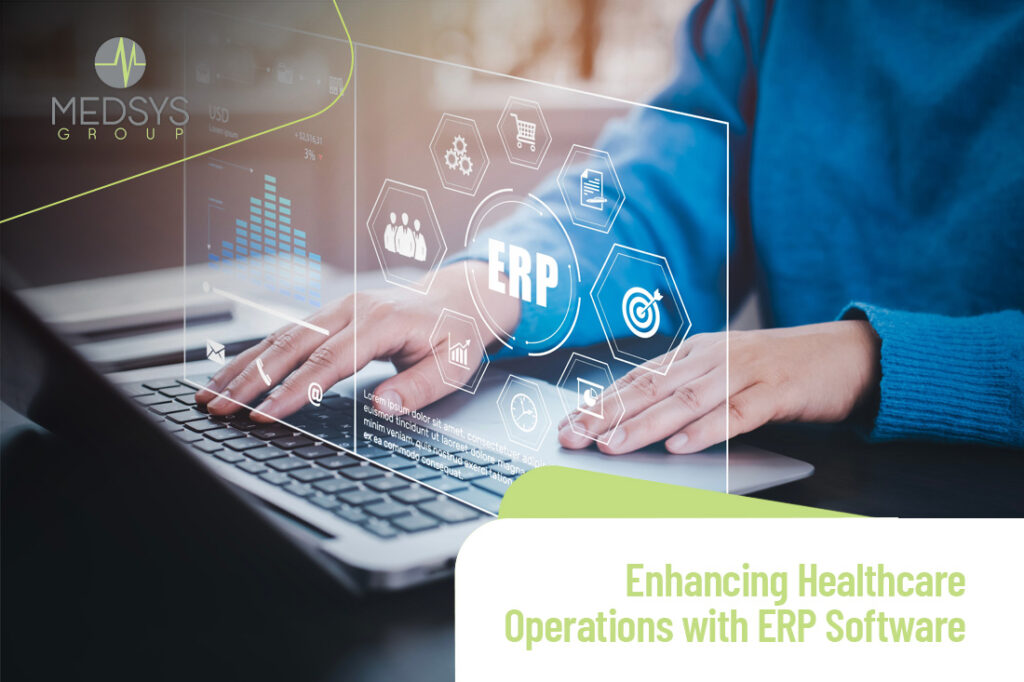
Adopting ERP software in healthcare is not just a change, it’s a breakthrough. It’s transforming how facilities manage everything from patient records to supply chain logistics. By integrating various departments and automating core processes, ERP systems empower healthcare organizations to manage their operations more effectively, leading to improved patient care and operational excellence. In this blog, we aim to break down how ERP software can completely revolutionize your healthcare IT and promote a new standard of patient care.
Understanding ERP in Healthcare
Definition of ERP Software: ERP (Enterprise Resource Planning) software is a comprehensive system that helps organizations manage and automate core business processes, including finance, human resources, and supply chain management. In healthcare, ERP systems serve as the central hub for data and workflows, enabling different departments to access and share information. This integration of various departments allows all the moving parts to work towards common goals, significantly increasing productivity.
Key Functionalities of ERP Systems in Healthcare: ERP systems in healthcare are designed to handle a wide range of functions:
· Finance Management: Streamlining financial operations, budgeting, and accounting.
· Human Resources: Managing employee records, payroll, and recruitment processes.
· Supply Chain Management: Ensuring efficient inventory management, procurement, and distribution of medical supplies.
The Strategic Importance of ERP for CIOs
Role of CIOs in Implementing ERP Systems: Chief Information Officers (CIOs) are not just part of the process, they are the critical players in successfully implementing ERP systems. They oversee the integration of ERP solutions with existing IT infrastructure and ensure that the system aligns with the organization’s strategic objectives. ERP systems offer significant benefits for CIOs, including improved data management, enhanced decision-making capabilities, and streamlined IT infrastructure.
· Improved Data Management: ERP systems centralize data, making managing and accessing crucial information easier. By providing a unified platform for different software applications, they can reduce redundancy and improve seamless interactions between various systems.
· Enhanced Decision-Making Capabilities: With real-time data and comprehensive analytics, CIOs can make informed decisions that drive organizational success.
· Streamlined IT Infrastructure: ERP systems consolidate multiple software applications, reducing complexity and improving efficiency.
ERP Implementation Strategies for PMOs and Project Executives
Importance of Project Management: Project Management Offices (PMOs) and Project Executives are essential for successfully implementing ERP systems. They ensure that the project is planned, executed, and monitored effectively.
Key Steps for Successful ERP Implementation:
· Planning: Defining project scope, objectives, and deliverables.
· Resource Allocation: Assigning the necessary resources and ensuring their optimal utilization.
· Timeline Management: Setting realistic timelines and milestones to track progress.
· Risk Mitigation: Identifying potential risks and developing strategies to address them.
·
Tips for Smooth ERP Rollouts: Effective change management and stakeholder engagement are critical. PMOs and Project Executives should communicate the benefits of ERP systems to all stakeholders and provide adequate training to ensure a smooth transition.
CMIOs and the Clinical Impact of ERP Systems
Role in Bridging Clinical and IT Operations: Chief Medical Information Officers (CMIOs) are vital in bridging the gap between clinical and IT operations. They ensure that ERP systems meet the organization’s clinical needs like workflow, patient data management, and regulatory compliance, leading to better patient care and operational efficiency.
Key ERP Features and Considerations
Important Features to Look For:
· Scalability: The ability to grow with the organization.
· Customization: Tailoring the system to meet specific organizational needs.
· User-Friendly Interface: Ensuring ease of use for all staff members.
· Robust Data Security: Protecting sensitive patient information.
Considerations for Choosing the Right ERP Vendor:
· Industry Experience: The vendor’s experience in the healthcare sector.
· Support Services: Availability of ongoing support and training.
· Cost-Effectiveness: Ensuring the system provides value for money.
MedSys Group’s ERP Solutions
MedSys Group offers comprehensive ERP advisory and implementation services tailored to the healthcare industry. Their expertise ensures that ERP systems are implemented smoothly and effectively.
Success Stories: MedSys Group has successfully implemented ERP systems for various healthcare organizations, resulting in enhanced operational efficiency and patient care. Please learn more about MedSys Group’s ERP solutions by visiting our advisory and implementation services pages.
ERP systems offer numerous benefits for healthcare organizations, including improved efficiency, better data management, and better patient care. By exploring ERP solutions, healthcare executives can drive their organizations towards greater operational excellence and better patient outcomes. Contact MedSys Group today to explore how our ERP solutions can transform your healthcare operations and help you achieve your healthcare organization’s goals.


